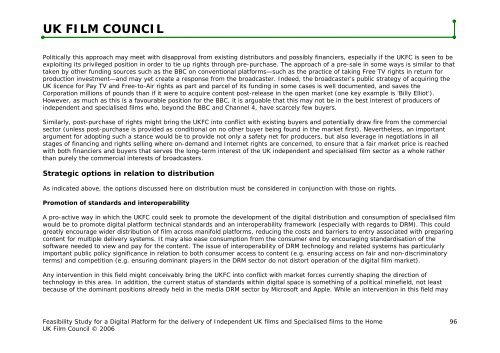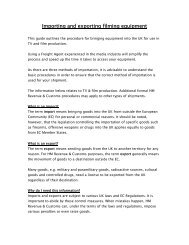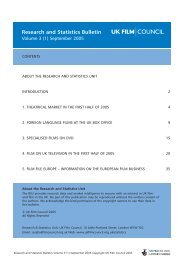Feasibility Study of a Digital Platform for the delivery of UK ... - BFI
Feasibility Study of a Digital Platform for the delivery of UK ... - BFI
Feasibility Study of a Digital Platform for the delivery of UK ... - BFI
Create successful ePaper yourself
Turn your PDF publications into a flip-book with our unique Google optimized e-Paper software.
<strong>UK</strong> FILM COUNCIL<br />
Politically this approach may meet with disapproval from existing distributors and possibly financiers, especially if <strong>the</strong> <strong>UK</strong>FC is seen to be<br />
exploiting its privileged position in order to tie up rights through pre-purchase. The approach <strong>of</strong> a pre-sale in some ways is similar to that<br />
taken by o<strong>the</strong>r funding sources such as <strong>the</strong> BBC on conventional plat<strong>for</strong>ms—such as <strong>the</strong> practice <strong>of</strong> taking Free TV rights in return <strong>for</strong><br />
production investment—and may yet create a response from <strong>the</strong> broadcaster. Indeed, <strong>the</strong> broadcaster’s public strategy <strong>of</strong> acquiring <strong>the</strong><br />
<strong>UK</strong> licence <strong>for</strong> Pay TV and Free-to-Air rights as part and parcel <strong>of</strong> its funding in some cases is well documented, and saves <strong>the</strong><br />
Corporation millions <strong>of</strong> pounds than if it were to acquire content post-release in <strong>the</strong> open market (one key example is ‘Billy Elliot’).<br />
However, as much as this is a favourable position <strong>for</strong> <strong>the</strong> BBC, it is arguable that this may not be in <strong>the</strong> best interest <strong>of</strong> producers <strong>of</strong><br />
independent and specialised films who, beyond <strong>the</strong> BBC and Channel 4, have scarcely few buyers.<br />
Similarly, post-purchase <strong>of</strong> rights might bring <strong>the</strong> <strong>UK</strong>FC into conflict with existing buyers and potentially draw fire from <strong>the</strong> commercial<br />
sector (unless post-purchase is provided as conditional on no o<strong>the</strong>r buyer being found in <strong>the</strong> market first). Never<strong>the</strong>less, an important<br />
argument <strong>for</strong> adopting such a stance would be to provide not only a safety net <strong>for</strong> producers, but also leverage in negotiations in all<br />
stages <strong>of</strong> financing and rights selling where on-demand and Internet rights are concerned, to ensure that a fair market price is reached<br />
with both financiers and buyers that serves <strong>the</strong> long-term interest <strong>of</strong> <strong>the</strong> <strong>UK</strong> independent and specialised film sector as a whole ra<strong>the</strong>r<br />
than purely <strong>the</strong> commercial interests <strong>of</strong> broadcasters.<br />
Strategic options in relation to distribution<br />
As indicated above, <strong>the</strong> options discussed here on distribution must be considered in conjunction with those on rights.<br />
Promotion <strong>of</strong> standards and interoperability<br />
A pro-active way in which <strong>the</strong> <strong>UK</strong>FC could seek to promote <strong>the</strong> development <strong>of</strong> <strong>the</strong> digital distribution and consumption <strong>of</strong> specialised film<br />
would be to promote digital plat<strong>for</strong>m technical standards and an interoperability framework (especially with regards to DRM). This could<br />
greatly encourage wider distribution <strong>of</strong> film across manifold plat<strong>for</strong>ms, reducing <strong>the</strong> costs and barriers to entry associated with preparing<br />
content <strong>for</strong> multiple <strong>delivery</strong> systems. It may also ease consumption from <strong>the</strong> consumer end by encouraging standardisation <strong>of</strong> <strong>the</strong><br />
s<strong>of</strong>tware needed to view and pay <strong>for</strong> <strong>the</strong> content. The issue <strong>of</strong> interoperability <strong>of</strong> DRM technology and related systems has particularly<br />
important public policy significance in relation to both consumer access to content (e.g. ensuring access on fair and non-discriminatory<br />
terms) and competition (e.g. ensuring dominant players in <strong>the</strong> DRM sector do not distort operation <strong>of</strong> <strong>the</strong> digital film market).<br />
Any intervention in this field might conceivably bring <strong>the</strong> <strong>UK</strong>FC into conflict with market <strong>for</strong>ces currently shaping <strong>the</strong> direction <strong>of</strong><br />
technology in this area. In addition, <strong>the</strong> current status <strong>of</strong> standards within digital space is something <strong>of</strong> a political minefield, not least<br />
because <strong>of</strong> <strong>the</strong> dominant positions already held in <strong>the</strong> media DRM sector by Micros<strong>of</strong>t and Apple. While an intervention in this field may<br />
<strong>Feasibility</strong> <strong>Study</strong> <strong>for</strong> a <strong>Digital</strong> <strong>Plat<strong>for</strong>m</strong> <strong>for</strong> <strong>the</strong> <strong>delivery</strong> <strong>of</strong> Independent <strong>UK</strong> films and Specialised films to <strong>the</strong> Home<br />
<strong>UK</strong> Film Council © 2006<br />
96
















